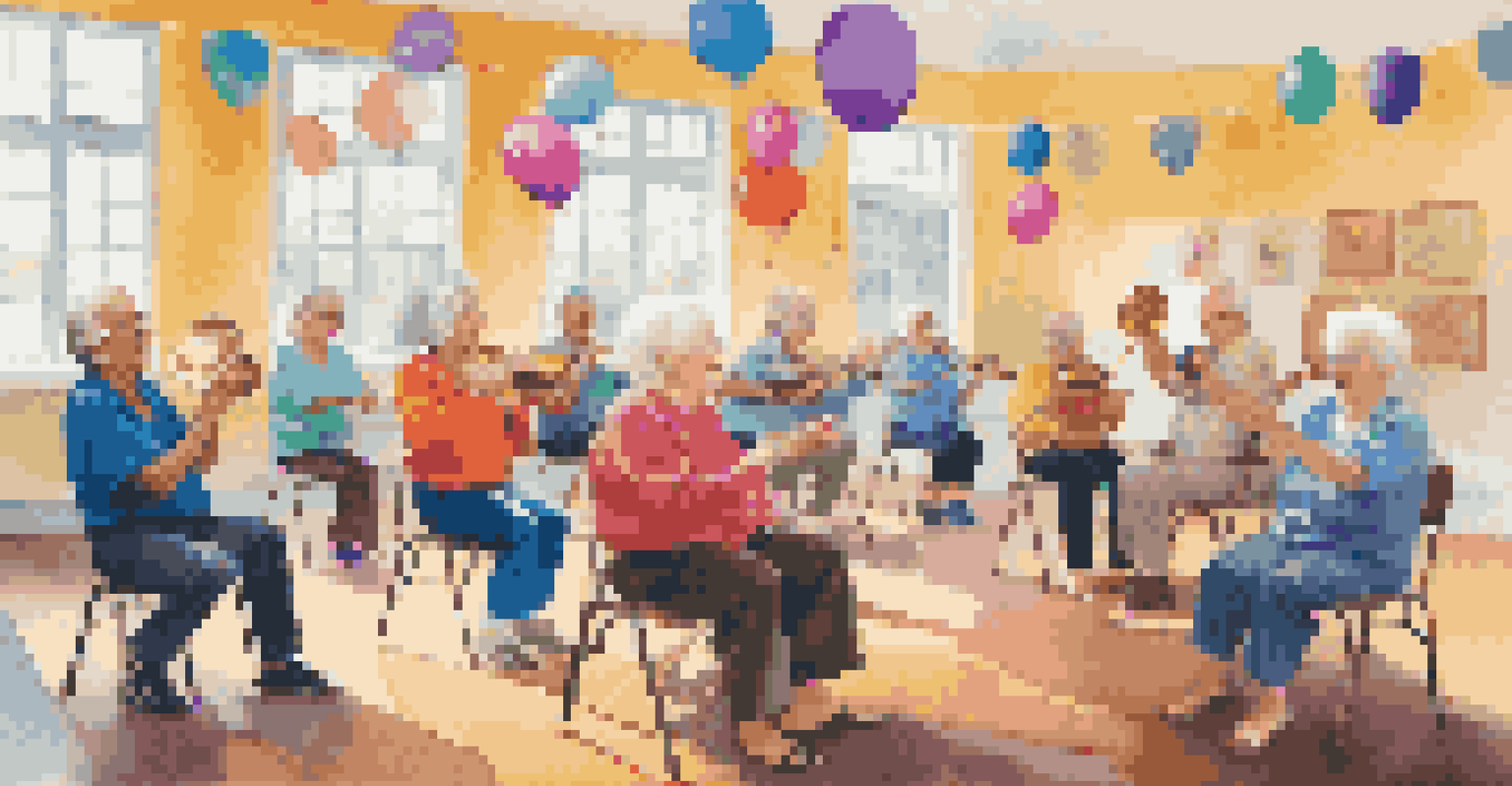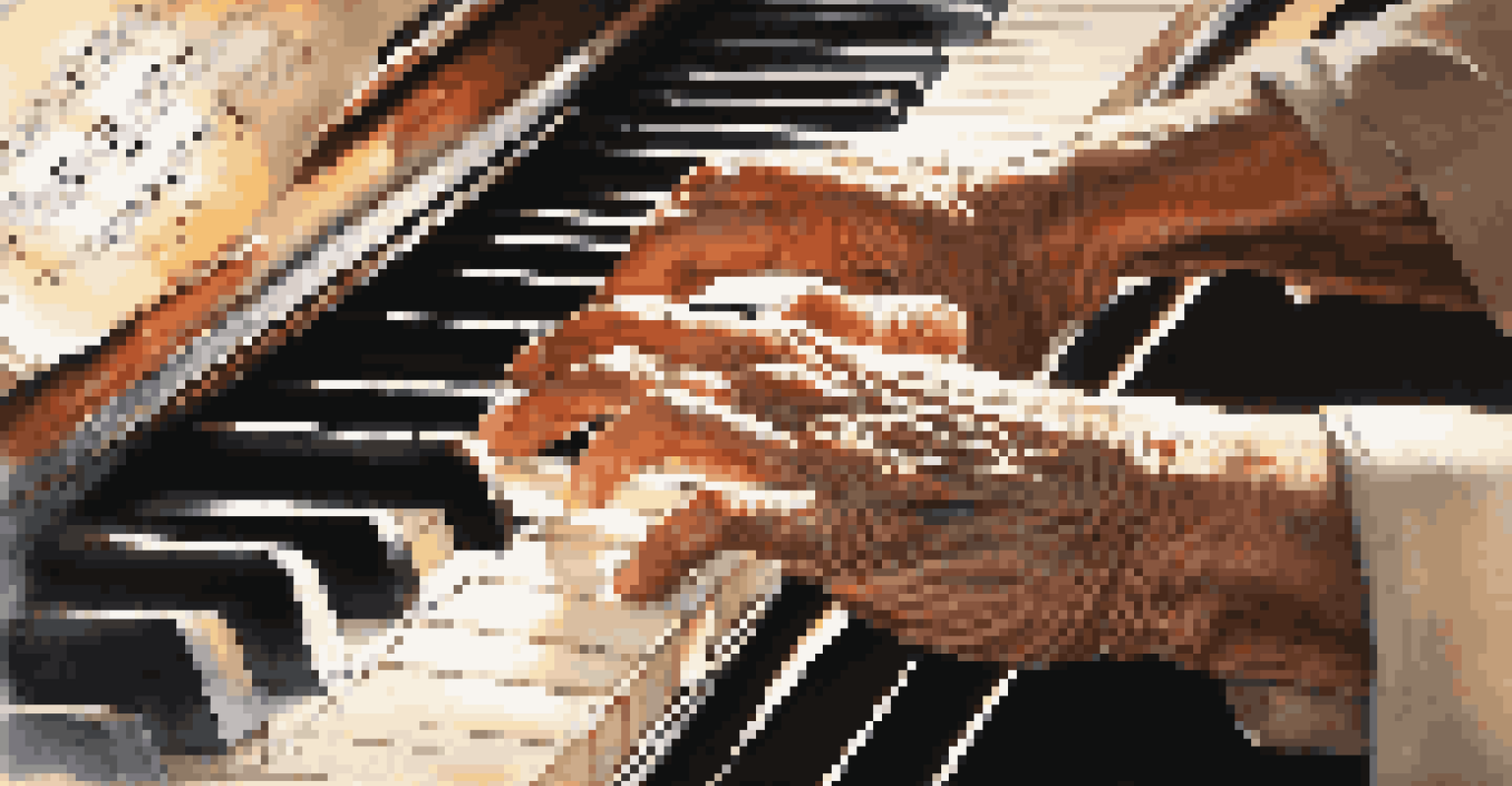Music and Aging: A Look at the Future of Music Therapy

Understanding Music Therapy and Its Benefits
Music therapy is a clinical and evidence-based use of music interventions to accomplish individualized goals within a therapeutic relationship. It can benefit various populations, but its impact on older adults is particularly noteworthy. Research shows that music therapy can improve cognitive functions, emotional well-being, and even physical health, making it a powerful tool for aging individuals.
Music can change the world because it can change people.
For example, consider how a simple song can evoke memories from decades past, transporting individuals back to moments of joy or nostalgia. These experiences can enhance mood and provide a sense of connection to one’s past, which is vital for maintaining identity as we age. This emotional resonance is why music therapy is increasingly integrated into care plans for older adults.
Moreover, music therapy can encourage social interaction, providing a platform for individuals to connect with peers through group sessions. This communal experience fosters a sense of belonging and combats feelings of isolation, which can be prevalent among the elderly. As we explore the future of music therapy, these benefits will remain central to its practice.
The Science Behind Music and the Aging Brain
As we age, our brains undergo various changes that can affect memory, cognition, and emotional regulation. Music can act as a catalyst for engaging different parts of the brain, potentially reversing or alleviating some of these age-related declines. Studies indicate that listening to or participating in music activities can activate neural pathways, enhancing cognitive functioning and memory recall.

For instance, a study involving seniors with dementia showed that familiar songs could trigger memories and conversations that seemed lost. This phenomenon highlights how deeply ingrained music is in our personal narratives and how it can be harnessed for therapeutic gains. It's a fascinating intersection of neuroscience and artistry.
Music Therapy Enhances Well-Being
Music therapy significantly improves cognitive function, emotional health, and social connections for older adults.
Understanding the brain's response to music also opens the door for innovative therapies tailored to the needs of older adults. As researchers continue to explore this relationship, we can expect to see more personalized music therapy approaches that cater to individual preferences and neurological conditions.
Music Therapy's Role in Managing Dementia and Alzheimer's
Dementia and Alzheimer's disease present unique challenges for individuals and caregivers alike. Music therapy has emerged as a valuable tool in managing these conditions, offering a non-pharmacological option to enhance quality of life. Through structured music activities, patients can experience improvements in communication, mood, and even daily functioning.
The best way to predict the future is to create it.
Consider a scenario where a caregiver plays a favorite song for a patient with Alzheimer's. The patient might begin to sing along, reminisce about past events, or even engage in conversation—moments that can be fleeting yet profound. Such interactions highlight the power of music in bridging the gaps created by cognitive decline.
Furthermore, music therapy can alleviate anxiety and agitation that often accompany dementia. By creating a calming environment through music, therapists help patients feel more at ease, allowing for a more positive caregiving experience. As we look to the future, the integration of music therapy in dementia care is poised to expand and evolve.
The Future of Music Therapy in Senior Care Settings
As the population ages, the demand for innovative and effective care solutions grows. Music therapy is increasingly recognized as an essential component of holistic care in senior living facilities, rehabilitation centers, and home care services. Its adaptability allows therapists to tailor sessions to meet the diverse needs of older adults, making it a versatile option in various settings.
Looking ahead, we can anticipate a surge in training programs for music therapists specializing in geriatrics. This focus on education will ensure that caregivers are equipped with the knowledge and skills to implement music therapy effectively. Moreover, as awareness of the benefits of music therapy rises, more facilities are likely to incorporate it into their standard care protocols.
Personalized Approaches Are Key
Tailoring music therapy sessions to individual preferences boosts engagement and strengthens the therapeutic relationship.
The potential for technology in music therapy is also exciting. Virtual reality, apps, and other digital platforms can facilitate remote music therapy sessions, making it accessible to those who may not be able to attend in person. This innovation paves the way for a broader reach and more personalized experiences for older adults.
Personalizing Music Therapy for Individual Needs
Personalization is key when it comes to music therapy. Each individual has unique musical preferences and life experiences that should be honored in therapeutic settings. By understanding a person's musical history, therapists can craft sessions that resonate more deeply and meaningfully with clients.
For example, a therapist might discover that a patient has a fondness for jazz music from their youth. Incorporating these preferences can lead to more engaging sessions and foster a stronger emotional connection. This tailored approach not only boosts the effectiveness of the therapy but also helps build rapport between therapist and patient.
As we move forward, the importance of customizing music therapy programs will likely become a standard practice. This will further enhance the therapeutic experience, creating a more profound impact on the emotional and cognitive well-being of older adults.
Integrating Music Therapy with Other Therapeutic Modalities
The integration of music therapy with other therapeutic modalities can create a comprehensive care approach that addresses multiple aspects of an individual's well-being. When combined with physical, occupational, or speech therapy, music can enhance motivation and engagement in these practices. For instance, using rhythm and movement in music therapy can support physical rehabilitation efforts.
Imagine an elderly patient recovering from a stroke. Incorporating rhythmic music into their physical therapy sessions can improve coordination and make exercises more enjoyable. The synergy between music and other therapeutic practices can lead to improved outcomes and a more holistic approach to health care.
Integration with Other Therapies
Combining music therapy with other therapeutic modalities enhances motivation and overall rehabilitation outcomes for seniors.
As we look to the future, the collaboration between different therapy disciplines will likely become more prevalent. This integrated approach can lead to innovative programs that harness the strengths of each modality, ultimately benefiting the aging population.
Challenges and Opportunities in Music Therapy for Seniors
While the benefits of music therapy for seniors are clear, challenges persist in its implementation and accessibility. Limited funding for music therapy programs, particularly in senior care facilities, can hinder their growth and reach. Additionally, there may be a lack of trained music therapists specializing in geriatrics, creating a gap in services available to older adults.
However, these challenges also present opportunities for advocacy and innovation. By raising awareness about the benefits of music therapy, stakeholders can push for increased funding and support for these programs. Furthermore, educational institutions can develop specialized training for aspiring music therapists, ensuring a steady influx of professionals dedicated to this field.

Looking ahead, the potential for music therapy to become a mainstream aspect of senior care is promising. With continued efforts to overcome challenges, we can create a future where music therapy is accessible to all older adults, enhancing their quality of life significantly.
Conclusion: The Transformative Power of Music Therapy
In conclusion, music therapy holds transformative potential for aging populations. Through its ability to enhance cognitive function, emotional well-being, and social connections, it stands out as a vital component of holistic care for seniors. As we continue to explore and expand the applications of music therapy, we open doors to enriching the lives of older adults.
The journey of integrating music therapy into senior care is ongoing, filled with both challenges and opportunities. By prioritizing personalized approaches, interdisciplinary collaboration, and awareness-raising efforts, we can pave the way for a brighter future for our aging populations. This commitment will ultimately lead to more fulfilling lives for seniors.
As we embrace the future of music therapy, let us remember the profound impact that music can have on our lives at any age. By harnessing its power, we can foster a culture of care that honors the rich tapestry of experiences and emotions that accompany aging.